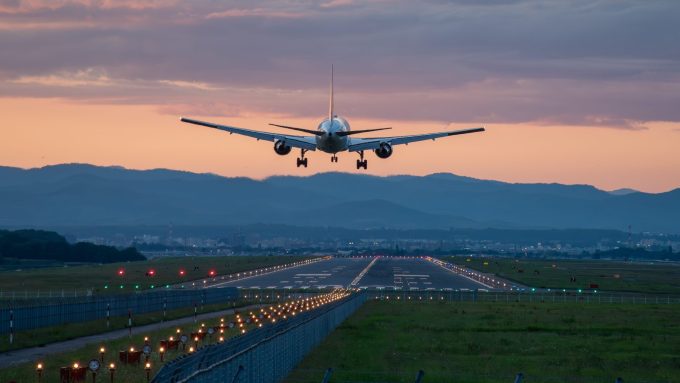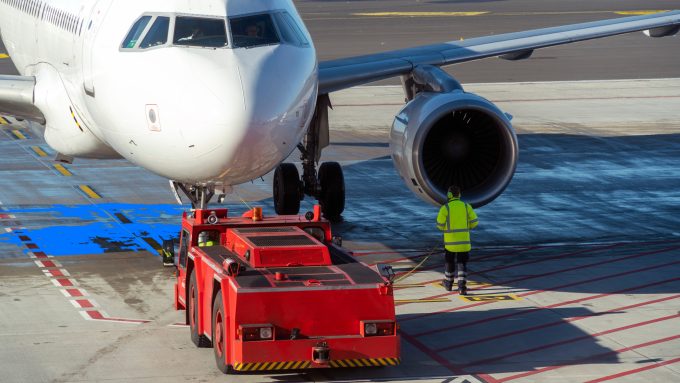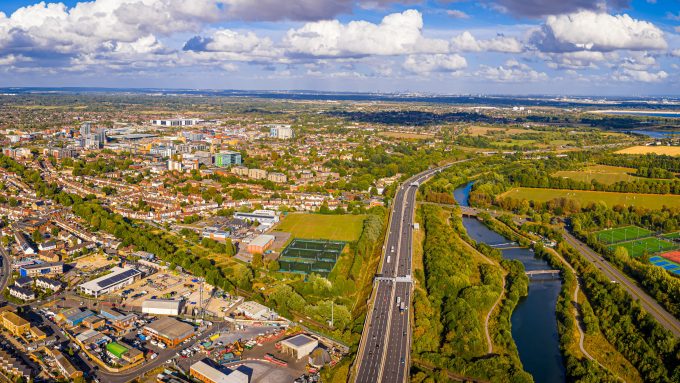
Meet the Academic exploring opportunities for hydrogen in aviation

Hydrogen powered commercial aircraft could begin welcoming passengers within a decade, predicts Cranfield University’s new Associate Professor of Airport Decarbonisation, Thomas Budd.
“It would be fantastic to see; but we can't wait and expect it to happen,” he explains. “If we are going to start flying hydrogen planes, there's lots of work that needs to be done to prove the fuel can be handled safely and efficiently at airports.”
This summer, Thomas was selected by Connected Places Catapult and the Innovation Launchpad Network+ panel to become a Researcher in Residence to take forward a programme called Project ZEGO – or ‘Zero Emissions Ground Operations’. The programme explores the potential for how airports can be assisted in transitioning away from kerosene; starting with decarbonising ground support equipment, such as baggage handling vehicles.
“Ground handling represents a significant contributor to airport emissions. Using hydrogen for this purpose provides an opportunity for the sector to learn how to safely and efficiently handle it at an airport – and in a commercially viable way. This is an enabling activity towards supporting a bigger transition to zero emission flight.”Thomas Budd, Cranfield University’s Associate Professor of Airport Decarbonisation
Thomas recognises that the issues of sustainability and decarbonisation have been around a long while, but points out that aviation’s environmental impact has grown in the public consciousness in recent years.
“The volume and breadth of work being conducted across the academic sector indicates the severity of the situation,” he adds. “I’d like to think our work is making a difference.”
A lifelong love of geography
Thomas grew up in Oadby near Leicester, and studied geography at Durham University; a not unexpected step. “My family are all geographers, so I probably didn’t have much of a choice.”
Both his mother and father specialised in the subject at Leicester University; Mum as a researcher and Dad as a lecturer. Tom’s older sister is also a geographer and works in air transport as well. “We had a family joke that our holidays were really geography field trips.
“There was never a moment when my parents said I should study geography because it's exciting and relevant; that was self-evident from their passion for the subject, the places we saw and the way they interpreted the world. Geography is kind of everything: I don't think it's a surprise that lots of people who have done geography have roles that require them to have a broad overview of a variety of different subjects.”
During his studies, Thomas took an interest in atmospheric sciences, and the threat of climate change – especially on cold environments – before focusing on the emerging practice of carbon offsetting for air transport for his final year dissertation. “There was a lot of quite legitimate critiquing of how these carbon offsets were calculated, and whether they actually make any difference in terms of cutting emissions.”
He graduated in 2007, at the start of the UK financial crisis. “I found it difficult to find a role I thought I suited, and that I would enjoy. At that point, I wasn't entirely sure what I wanted to do.”
At the time, Tom’s sister was lecturing at Loughborough University, which was advertising a PhD opportunity looking at the travel behaviour of airport passengers going to and from airports. “It wasn’t completely aligned with my previous work around aircraft emissions, but the more I read about the project, I was convinced that's what I wanted to do. So I applied and was successful.”
Carving out a niche area of research
Thomas found that focusing on the environmental impact of airports – as opposed to aircraft – to be a niche area of research. Travelling to and from airports “frankly doesn’t get a great deal of attention”, he acknowledges. However, getting involved in a specialist field appealed. “I quite like the idea of tackling something that hasn't really had a great deal of attention; it gives you scope to put your stamp on it.”
The project considered if passengers and employees at Manchester Airport could be encouraged to use transport more sustainably – but not just in terms of switching from private cars to buses and trains. It also meant encouraging airport users who normally get dropped off by a friend at the terminal (known as ‘kiss and fly’) to consider driving there and parking instead.
“Dropping off and picking up involves four journeys, whereas driving and parking is just two,” he explains.
His work involved collecting data, conducting surveys and categorising users into different ‘personas’ based on their attitudes, perceptions and their revealed and stated behaviours. He considered what motivates passengers to behave in certain ways, and whether some groups of airport users could be ‘nudged’ to change their behaviour.

Advancing his academic journey
After completing his PhD in 2013, Thomas became a research fellow in sustainable travel practices at the University of Aberdeen, where he met Professor Jillian Anable; a specialist in market segmentation and social psychology. Thomas helped to explore the effect of travel disruption on people’s lives, and how some cope better than others.
While conducting his PhD, one of the partner universities on the project was Cranfield University and – when a position became available as a research and teaching fellow in 2014 – Thomas seized the opportunity; focusing on airport planning and management.
He also became a fellow with DARTeC, the Digital Aviation Research and Technology Centre at Cranfield, exploring how journeys can be made more seamless, safe and sustainable with digital and potentially disruptive technologies.
Thomas reflects that airport expansion was a big theme 10 years ago, but less so now. He adds that since Covid, there is more of a call to better use existing capacity, as opposed to laying more concrete, although he doesn’t rule out airport expansion entirely.
Earlier this year, Thomas was promoted to the role of Associate Professor of Airport Decarbonisation at Cranfield University, a role co-funded by Heathrow. “There is always something going on at Cranfield; whether it's trialling hydrogen tugs pushing aircraft, or drone activity,” he says.
Getting more hydrogen into aviation will involve many supply chain players, as well as providing sufficient refuelling infrastructure. “Currently, there are considerable gaps in terms of regulations and standards for handling and operating hydrogen vehicles and aircraft, and around training for those who will be handling hydrogen.”
But the size of the prize could be great. “For air transport, there isn't a huge amount of choice in terms of alternative fuels if the sector is to decarbonise and reach its ambitious targets. Changing the fuel used is the step change that's required. Unless something very significant happens to battery technology, hydrogen is the main player in town.”

Recognising a productive alliance with the Catapult
Tom got involved with Connected Places Catapult through the Transport Research & Innovation Grants programme, which funded Cranfield University, Cranfield Aerospace Solutions and Cranfield Airport in 2021 to examine the safety aspects of handling hydrogen aircraft; before getting involved in the Researchers in Residence scheme, which launched in 2022 and began its search for an academic involved in zero emission airports last year.
“I started to understand the Catapult’s breadth of activity; how they work with academia, industry and Government. It’s been a really productive relationship, and I’m grateful for the support that the Catapult continues to provide.
“The funding is clearly important, but so are the connections made and its joining of the dots between different parts of the sector; bringing people into the same space to tackle shared challenges.
“Being an academic is a worthwhile endeavour,” he adds. “You ultimately get to spend time focused on something you are passionate about; in my case decarbonising airports and making the sector more sustainable. I feel I’m making a contribution.”
Find out more about the Researchers in Residence scheme, which is led by the Innovation Launchpad Network+ and funded by the Engineering & Physical Sciences Research Council. To be alerted about opportunities at Connected Places Catapult, join our Academic Network.





